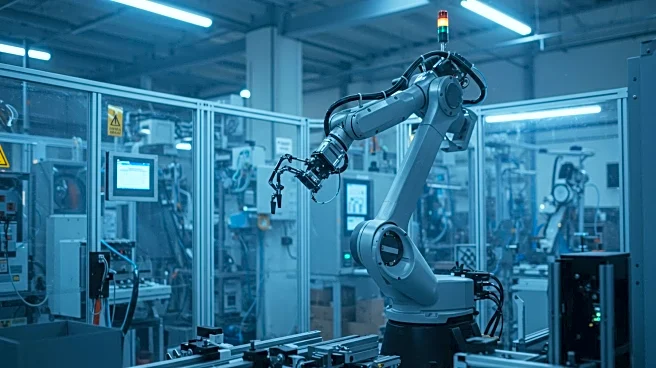What's Happening?
Artificial intelligence is increasingly seen as a threat to office jobs, prompting a shift in career preferences towards blue-collar work. Geoffrey Hinton, a Nobel Prize-winning computer scientist, has suggested that manual labor jobs, such as plumbing, are less vulnerable to AI advancements compared to roles like legal assistants and paralegals. Microsoft has identified several occupations at risk due to AI, including interpreters, historians, and customer service representatives. In contrast, manual jobs such as roofers and hazardous material removal workers are considered safer. The Bureau of Labor Statistics projects growth in trade job openings, while entry-level positions for college graduates stagnate. Concerns about AI-related job losses are influencing career choices, particularly among Generation Z, who are increasingly pursuing skilled trade jobs to avoid student debt and the risk of being replaced by AI.
Why It's Important?
The shift towards blue-collar jobs highlights the growing concern over AI's impact on employment. As AI technology advances, it poses a threat to traditional white-collar roles, potentially displacing a significant portion of the workforce. This trend could lead to increased demand for skilled trades, offering job security and financial stability without the burden of student loans. The potential displacement of office jobs by AI could reshape the U.S. labor market, affecting economic stakeholders and prompting changes in education and career planning. The emphasis on manual labor jobs underscores the need for workers who can perform tasks that AI cannot easily replicate, ensuring continued demand for these roles.
What's Next?
As AI continues to evolve, the labor market may experience further shifts, with more individuals opting for careers in skilled trades. Companies and educational institutions might need to adapt by offering training programs that focus on manual skills and expertise. The development of AI and robotics could lead to new opportunities for collaboration between humans and machines, particularly in industries like automotive repair. Policymakers and industry leaders may need to address the potential impact of AI on employment, considering measures to support workers transitioning to new roles and ensuring job security in the face of technological advancements.
Beyond the Headlines
The rise of AI and its impact on employment raises ethical and cultural questions about the future of work. The potential displacement of office jobs by AI could exacerbate economic inequality, as those without access to education or training in skilled trades may face limited job prospects. The shift towards blue-collar work also challenges societal perceptions of career prestige and success, prompting a reevaluation of the value placed on manual labor jobs. As AI technology progresses, it is crucial to consider the long-term implications for workers and industries, ensuring that technological advancements benefit society as a whole.











